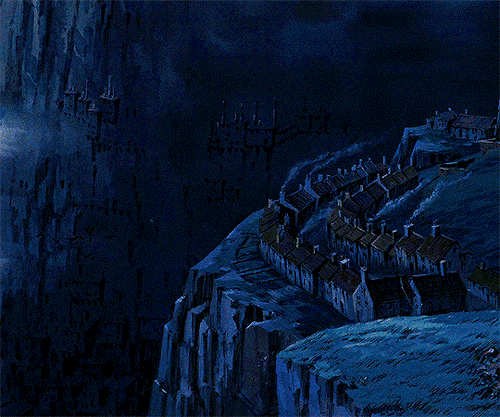
Hi Everyone! I'm Wyrm, Way's best friend and beta-reader.Keep your head up, and face each day as it comes.You've got this!!!
81 posts
Someone Asked Me To Expand A Little On A Topic That Was Buried Down In A Big Chain Of Reblogs, So I'm
Someone asked me to expand a little on a topic that was buried down in a big chain of reblogs, so I'm doing that here--it's about the use of the archaic "thee", "thou", "thy", etc. in LOTR and what it tells you about characters’ feelings for one another. (I am NOT an expert on this, so it's just what I've picked up over time!)
Like many (most?) modern English speakers, I grew up thinking of those old forms of 2nd person address as being extra formal. I think that's because my main exposure to them was in the Bible ("thou shall not...") and why wouldn't god, speaking as the ultimate authority, be using the most formal, official voice? But it turns out that for a huge chunk of the history of the English language, "thee," "thou," and "thy" were actually the informal/casual alternatives to the formal "you", “your”, “yours”. Like tú v. usted in Spanish!
With that in mind, Tolkien was very intentional about when he peppered in a "thee" or a "thou" in his dialogue. It only happens a handful of times. Most of those are when a jerk is trying to make clear that someone else is beneath them by treating them informally. Denethor "thou"s Gandalf when he’s pissed at him. The Witch King calls Éowyn "thee" to cut her down verbally before he cuts her down physically. And the Mouth of Sauron calls Aragorn and Gandalf "thou" as a way to show them that he has the upper hand. (Big oops by all 3 of these guys!)
The other times are the opposite--it's when someone starts to use the informal/casual form as a way to show their feeling of affection for someone else. Galadriel goes with the formal "you" all through the company's days in Lórien, but by the time they leave she has really taken them to heart. So when she sends them a message via Gandalf early in the Two Towers, she uses "thee" and "thou" in her words to Aragorn, Legolas and Gimli because now they're valued friends and allies. And--this is the big one, folks, that was already alluded to in my previous post--Éowyn starts aggressively "thou"ing Aragorn when she is begging him to take her along as he prepares to ride out of Dunharrow. She is very intentionally trying to communicate her feelings to him in her choice of pronoun--an "I wouldn't be calling you "thee" if I didn't love you" kind of thing. And he is just as intentionally using "you" in every single one of his responses in order to gently establish a boundary with her without having to state outright that he doesn't reciprocate her feelings. It's not until much later when her engagement to Faramir is announced that Aragorn finally busts out "I have wished thee joy ever since I first saw thee". Because now it is safe to acknowledge a relationship of closeness and familiarity with her without the risk that it will be misinterpreted. He absolutely wants to have that close, familiar relationship, but he saved it for when he knew she could accept it on his terms without getting hurt.
So, you know, like all things language-based...Tolkien made very purposeful decisions in his word choices down to a bonkers level of detail. I didn’t know about this pronoun thing until I was a whole ass adult, but that’s the joy of dealing with Tolkien. I still discover new things like this almost every time I re-read.
-
 valexwest liked this · 4 months ago
valexwest liked this · 4 months ago -
 cat-eared-exam-taker liked this · 4 months ago
cat-eared-exam-taker liked this · 4 months ago -
 literamour liked this · 4 months ago
literamour liked this · 4 months ago -
 souberbielle liked this · 4 months ago
souberbielle liked this · 4 months ago -
 onthatonequote liked this · 4 months ago
onthatonequote liked this · 4 months ago -
 altoskh liked this · 4 months ago
altoskh liked this · 4 months ago -
 zatriell reblogged this · 4 months ago
zatriell reblogged this · 4 months ago -
 hobbitskywalker reblogged this · 4 months ago
hobbitskywalker reblogged this · 4 months ago -
 hobbitskywalker liked this · 4 months ago
hobbitskywalker liked this · 4 months ago -
 btsnowflake liked this · 4 months ago
btsnowflake liked this · 4 months ago -
 henry-fox-biggest-stan reblogged this · 4 months ago
henry-fox-biggest-stan reblogged this · 4 months ago -
 zatriell liked this · 4 months ago
zatriell liked this · 4 months ago -
 thebellaedit reblogged this · 4 months ago
thebellaedit reblogged this · 4 months ago -
 seokoilua liked this · 4 months ago
seokoilua liked this · 4 months ago -
 goosekid reblogged this · 4 months ago
goosekid reblogged this · 4 months ago -
 doublecubicdeer liked this · 4 months ago
doublecubicdeer liked this · 4 months ago -
 themeanderingty liked this · 4 months ago
themeanderingty liked this · 4 months ago -
 teal-anchor liked this · 4 months ago
teal-anchor liked this · 4 months ago -
 tolkien-bout-doctor reblogged this · 4 months ago
tolkien-bout-doctor reblogged this · 4 months ago -
 crownprinceknut liked this · 4 months ago
crownprinceknut liked this · 4 months ago -
 geosparks liked this · 4 months ago
geosparks liked this · 4 months ago -
 girlgeekjf-blog reblogged this · 4 months ago
girlgeekjf-blog reblogged this · 4 months ago -
 girlgeekjf-blog liked this · 4 months ago
girlgeekjf-blog liked this · 4 months ago -
 wheresmybloodynauglamir liked this · 4 months ago
wheresmybloodynauglamir liked this · 4 months ago -
 hopecomesbacktolife reblogged this · 4 months ago
hopecomesbacktolife reblogged this · 4 months ago -
 hopecomesbacktolife liked this · 4 months ago
hopecomesbacktolife liked this · 4 months ago -
 nairamofsherwood liked this · 4 months ago
nairamofsherwood liked this · 4 months ago -
 peppermint-chocolate-cherries reblogged this · 4 months ago
peppermint-chocolate-cherries reblogged this · 4 months ago -
 dumbkiwi reblogged this · 4 months ago
dumbkiwi reblogged this · 4 months ago -
 dumbkiwi liked this · 4 months ago
dumbkiwi liked this · 4 months ago -
 bardtothebone liked this · 4 months ago
bardtothebone liked this · 4 months ago -
 demonictreegremlin liked this · 4 months ago
demonictreegremlin liked this · 4 months ago -
 multishipperpirateking reblogged this · 4 months ago
multishipperpirateking reblogged this · 4 months ago -
 celeluwhenfics reblogged this · 4 months ago
celeluwhenfics reblogged this · 4 months ago -
 bewarethepalantir reblogged this · 4 months ago
bewarethepalantir reblogged this · 4 months ago -
 celeluwhenfics liked this · 4 months ago
celeluwhenfics liked this · 4 months ago -
 dilettantefeminist liked this · 4 months ago
dilettantefeminist liked this · 4 months ago -
 emmanuellececchi reblogged this · 4 months ago
emmanuellececchi reblogged this · 4 months ago -
 tinyplanetss liked this · 4 months ago
tinyplanetss liked this · 4 months ago -
 mummelthecryptid liked this · 4 months ago
mummelthecryptid liked this · 4 months ago -
 cheeky-cheese liked this · 4 months ago
cheeky-cheese liked this · 4 months ago -
 losticaruss reblogged this · 4 months ago
losticaruss reblogged this · 4 months ago -
 musing-and-music reblogged this · 4 months ago
musing-and-music reblogged this · 4 months ago -
 smolgreybunny reblogged this · 4 months ago
smolgreybunny reblogged this · 4 months ago -
 torchwood-99 reblogged this · 4 months ago
torchwood-99 reblogged this · 4 months ago -
 from-the-coffee-shop-in-edoras reblogged this · 4 months ago
from-the-coffee-shop-in-edoras reblogged this · 4 months ago -
 garden-holic reblogged this · 4 months ago
garden-holic reblogged this · 4 months ago -
 garden-holic liked this · 4 months ago
garden-holic liked this · 4 months ago -
 allthewildhorses reblogged this · 4 months ago
allthewildhorses reblogged this · 4 months ago
More Posts from Paperbackbookwyrm



CASTLE IN THE SKY 1986 | dir. Hayao Miyazaki

Here’s my piece for Fire Nation @recovery-zine! It's been held back for quite a while and I'm excited to finally reveal it ❤️
The inspiration comes from the Lantern Festival in China's Anhui Province and the performance with those fish lanterns at night is really fantastic!
Fanfic Update!
Okay, so:
Latin has this word, sic. Or, if we want to be more diacritically accurate, sīc. That shows that the i is long, so it’s pronounced like “seek” and not like “sick.”
You might recognize this word from Latin sayings like “sic semper tyrannis” or “sic transit gloria mundi.” You might recognize it as what you put in parentheses when you want to be pass-agg about someone’s mistakes when you’re quoting them: “Then he texted me, ‘I want to touch you’re (sic) butt.’”
It means, “thus,” which sounds pretty hoity-toity in this modren era, so maybe think of it as meaning “in this way,” or “just like that.” As in, “just like that, to all tyrants, forever,” an allegedly cool thing to say after shooting a President and leaping off a balcony and shattering your leg. “Everyone should do it this way.”
Anyway, Classical Latin somewhat lacked an affirmative particle, though you might see the word ita, a synonym of sic, used in that way. By Medieval Times, however, sic was holding down this role. Which is to say, it came to mean yes.
Ego: Num edisti totam pitam?
Tu, pudendus: Sic.
Me: Did you eat all the pizza?
You, shameful: That’s the way it is./Yes.
This was pretty well established by the time Latin evolved into its various bastard children, the Romance languages, and you can see this by the words for yes in these languages.
In Spanish, Italian, Asturian, Catalan, Corsican, Galician, Friulian, and others, you say si for yes. In Portugese, you say sim. In French, you say si to mean yes when you’re contradicting a negative assertion (”You don’t like donkey sausage like all of us, the inhabitants of France, eat all the time?” “Yes, I do!”). In Romanian, you say da, but that’s because they’re on some Slavic shit. P.S. there are possibly more Romance languages than you’re aware of.
But:
There was still influence in some areas by the conquered Gaulish tribes on the language of their conquerors. We don’t really have anything of Gaulish language left, but we can reverse engineer some things from their descendants. You see, the Celts that we think of now as the people of the British Isles were Gaulish, originally (in the sense that anyone’s originally from anywhere, I guess) from central and western Europe. So we can look at, for example, Old Irish, where they said tó to mean yes, or Welsh, where they say do to mean yes or indeed, and we can see that they derive from the Proto-Indo-European (the big mother language at whose teat very many languages both modern and ancient did suckle) word *tod, meaning “this” or “that.” (The asterisk indicates that this is a reconstructed word and we don’t know exactly what it would have been but we have a pretty damn good idea.)
So if you were fucking Ambiorix or whoever and Quintus Titurius Sabinus was like, “Yo, did you eat all the pizza?” you would do that Drake smile and point thing under your big beefy Gaulish mustache and say, “This.” Then you would have him surrounded and killed.
Apparently Latin(ish) speakers in the area thought this was a very dope way of expressing themselves. “Why should I say ‘in that way’ like those idiots in Italy and Spain when I could say ‘this’ like all these cool mustache boys in Gaul?” So they started copying the expression, but in their own language. (That’s called a calque, by the way. When you borrow an expression from another language but translate it into your own. If you care about that kind of shit.)
The Latin word for “this” is “hoc,” so a bunch of people started saying “hoc” to mean yes. In the southern parts of what was once Gaul, “hoc” makes the relatively minor adjustment to òc, while in the more northerly areas they think, “Hmm, just saying ‘this’ isn’t cool enough. What if we said ‘this that’ to mean ‘yes.’” (This is not exactly what happened but it is basically what happened, please just fucking roll with it, this shit is long enough already.)
So they combined hoc with ille, which means “that” (but also comes to just mean “he”: compare Spanish el, Italian il, French le, and so on) to make o-il, which becomes oïl. This difference between the north and south (i.e. saying oc or oil) comes to be so emblematic of the differences between the two languages/dialects that the languages from the north are called langues d’oil and the ones from the south are called langues d’oc. In fact, the latter language is now officially called “Occitan,” which is a made-up word (to a slightly greater degree than that to which all words are made-up words) that basically means “Oc-ish.” They speak Occitan in southern France and Catalonia and Monaco and some other places.
The oil languages include a pretty beefy number of languages and dialects with some pretty amazing names like Walloon, and also one with a much more basic name: French. Perhaps you’ve heard of it, n'est-ce pas?
Yeah, eventually Francophones drop the -l from oil and start saying it as oui. If you’ve ever wondered why French yes is different from other Romance yeses, well, now you know.
I guess what I’m getting at is that when you reblog a post you like and tag it with “this,” or affirm a thing a friend said by nodding and saying “Yeah, that”: you’re not new
REBLOG if you have amazing talented artist friends!
